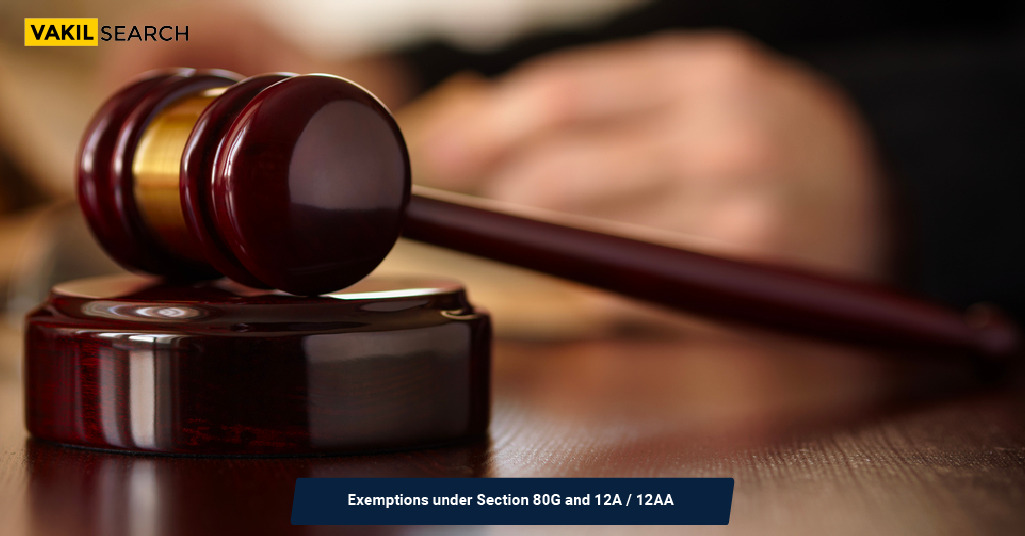Explore Indian tax exemptions (Sections 80G, 12A/12AA) promoting philanthropy. Learn recent updates and how Vakilsearch aids compliance for nonprofits.
Overview:
Charitable institutions play a vital role in the development and welfare of society. To incentivise and support these institutions, the Indian government offers various tax exemptions under Section 80G and 12A/12AA of the Income Tax Act. These exemptions aim to encourage donations and contributions towards charitable causes and ensure the smooth functioning of organisations involved in charitable work.
Charitable Purpose and Tax Exemptions
Charitable purposes, as defined by the Income Tax Act, include relief for the poor, education, medical relief, preservation of the environment, preservation of monuments or places of historic interest, and the advancement of any other object of general public utility. Organisations engaged in such activities can avail tax benefits under the mentioned sections.
Section 12A: Registration for Tax Exemption
Section 12A provides for the registration of NGOs seeking income exemption. Once registered under this section, the organisation’s income becomes non-taxable. If an NGO does not obtain 12A registration, income tax is levied on the surplus during the year.
Section 80G: Tax Benefits for Donors
Under Section 80G, donors to registered NGOs are eligible for financial benefits. The donations made are deductible from the donor’s taxable income, encouraging more contributions towards charitable causes.
Recent Amendments to Exemptions
In the Budget 2020, presented on 1st February 2020, Finance Minister Nirmala Sitharaman proposed significant changes to the existing norms related to exemptions under Sections 80G and 12A. These amendments were set to become effective from 1st June 2020.
Changes Proposed for Exemptions
-
Re-validation of Existing Registrations:
All existing charitable and religious institutions registered under Sections 12A, 12AA, 10(23C), and 80G were required to re-apply to income tax authorities to re-validate their existing registrations.
-
Mandatory Fresh Registration:
Charitable trusts and exempt institutions already registered under Sections 80G, 12A, or 12AA were mandated to obtain fresh registration by December 31, 2020.
Introduction of Section 12AB:
Existing registered trusts moved to a new provision, ‘Section 12AB,’ effective from 1st April 2021.
Online Process and Focus on Genuine Activities:
The re-validation and new registration processes were made online, focusing on the genuine charitable activities of the trust or institution.
Provisional Registration for New Institutions:
Newly established trusts and institutions applying for the first time were granted provisional registration for three years, subject to renewal.
Procedure for Registration and Renewal
The registration and renewal process under the revised norms follows a structured approach:
Application Submission:
Trusts and institutions needed to submit applications within a three-month window once the online forms were ready.
Validation and Renewal:
After processing, the registration under Sections 12AA and 80G may be re-validated by the income tax for a period of five years. Renewal applications had to be submitted at least six months prior to the expiry of this period.
Donation Statement Submission:
Charitable trusts or institutions registered under Section 80G must submit a statement of donations received in the prescribed form and manner.
Important Considerations for Donors
It’s essential for donors to be aware of specific considerations:
Exemptions Under Section 80G: Reduced Tax Rate Opt-out:
Tax deductions under Section 80G will not be available to donors (individuals or companies) who opt for a reduced rate of tax.
|
Aspect |
Current Scenario | New Scenario | New Updates as of 8th May |
Impact |
| Exemption Application under Section 12AA | Continuous availability once obtained | Re-application by Aug 31, 2020 | Re-application by March 31, 2020; New registration under 12AB | Burden on NGOs to reaffirm credentials with IT authorities |
| Validity of Exemption under Section 12AA | Lifetime validity unless department reviews | 5-year validity, requires re-application after the period | 5-year validity, necessitates re-application | NGOs must provide evidence and convince IT authorities periodically |
| Exemption for Newly Registered NGOs | Continuous exemption | Renewal after 3 years, then every 5 years | Renewal after 3 years, then every 5 years | Requires quicker proof of consistency for new NGOs |
| Donor-wise Details Maintenance | Overseas contributions only | Mandatory for all donors | Mandatory for all donors | Increased administrative burden for NGOs |
| Penalties for Delayed Filing of Returns | Existing provisions | ₹ 200 per day + penalty up to ₹ 100,000 | ₹ 200 per day + penalty up to ₹ 100,000 | Additional burden for delayed filing |
| Impact on FCRA Registration | Independent of Section 12A registration | Linked to Section 12AA registration | Linked to Section 12AA registration | Increased risk for NGOs dependent on overseas funds |
| Tax Deductions (Section 80G) | Stable availability | Not available if opting for reduced tax rate | Not available if opting for reduced tax rate | Taxpayers lose exemption benefit if opting for reduced tax rate |
In conclusion, the Indian government’s tax exemptions under Section 80G and 12A/12AA play a pivotal role in promoting charitable activities. These exemptions encourage individuals and entities to contribute to various causes, thereby fostering a spirit of philanthropy and driving positive change in society. Additionally, Vakilsearch provides valuable assistance to charitable organisations and donors in understanding, navigating, and complying with the latest amendments. Our expertise ensures seamless operations and enables contributions towards the betterment of society to have a more significant and lasting impact. It is imperative for both charitable organisations and donors to collaborate with entities like us to maximise the benefits of these exemptions and effectively contribute to the welfare of society.










